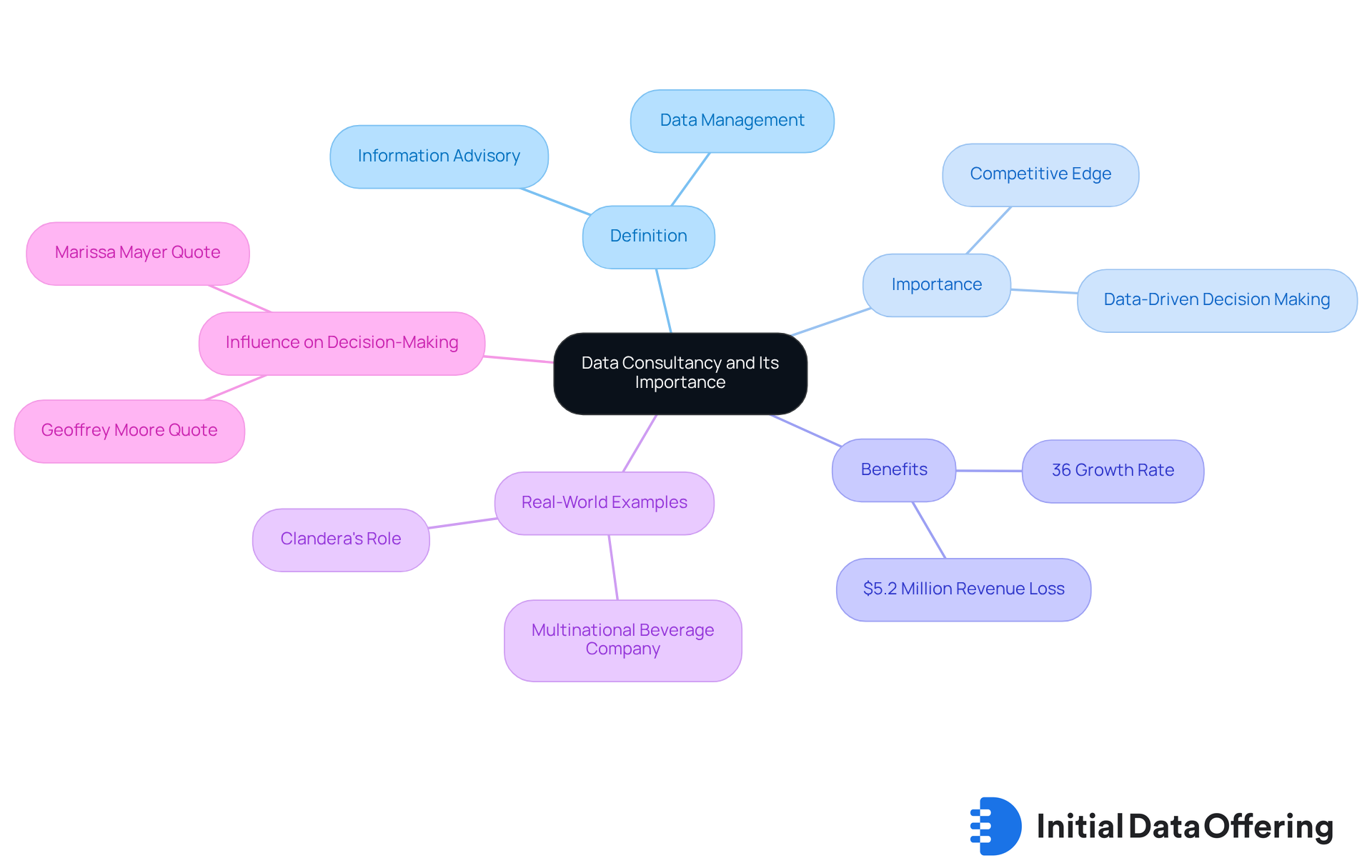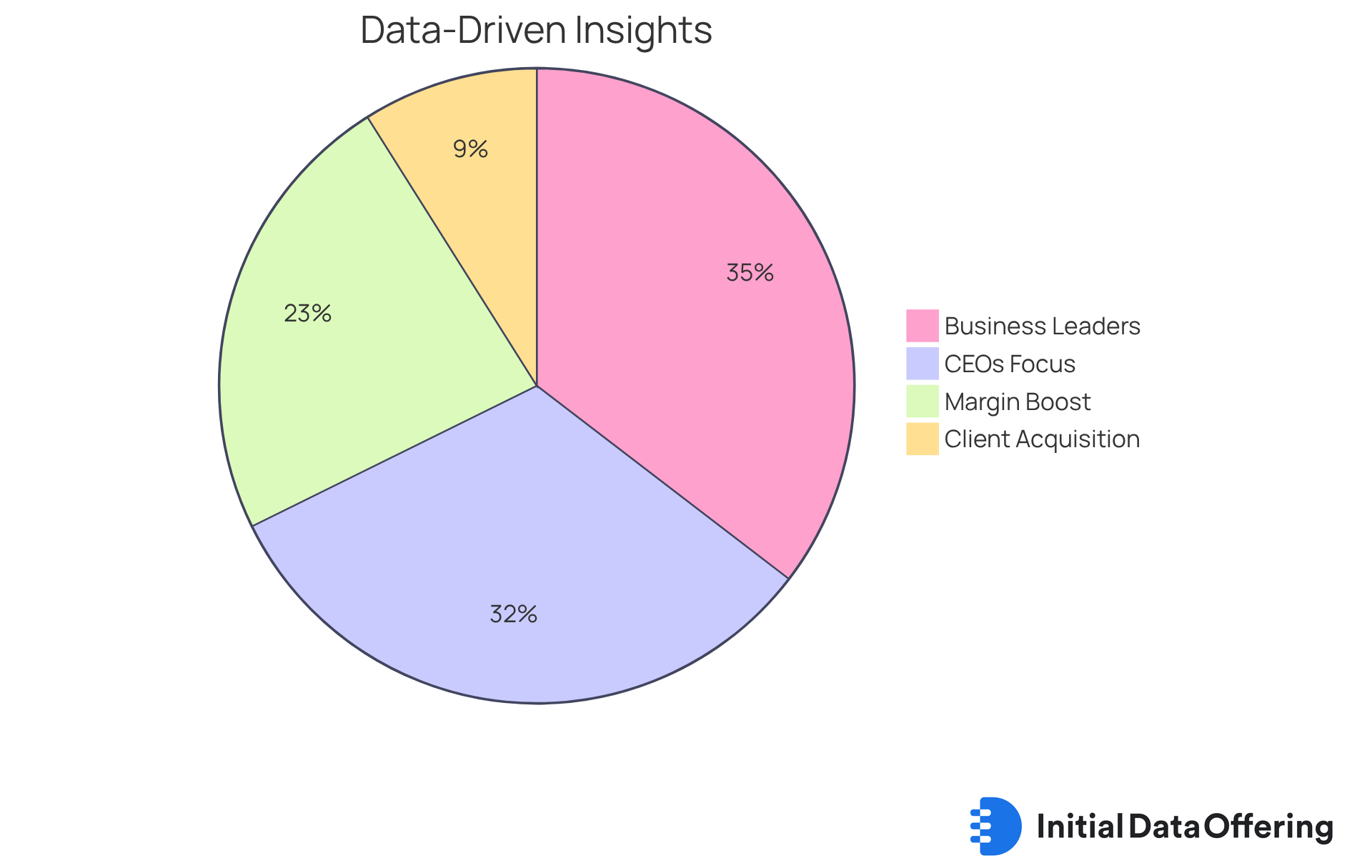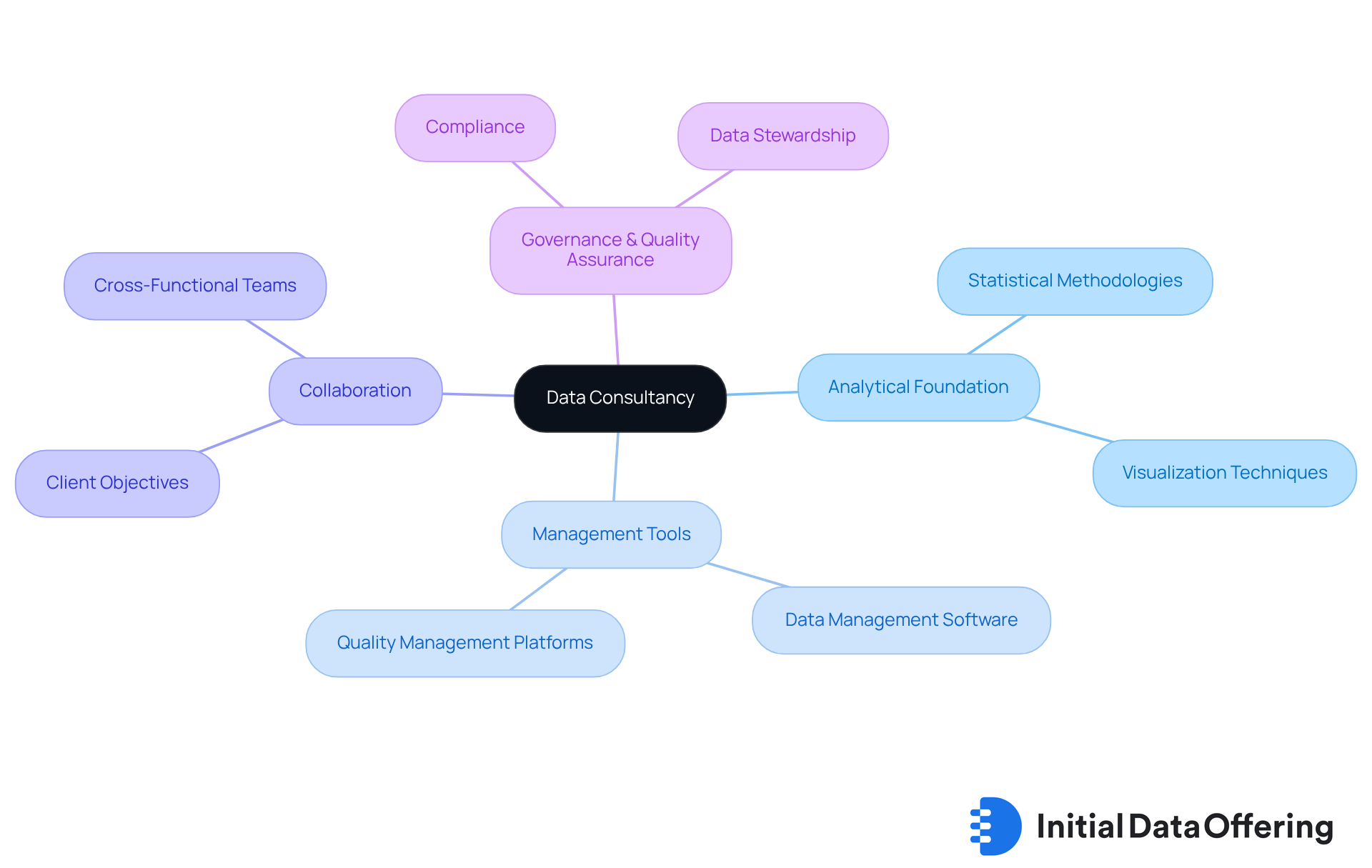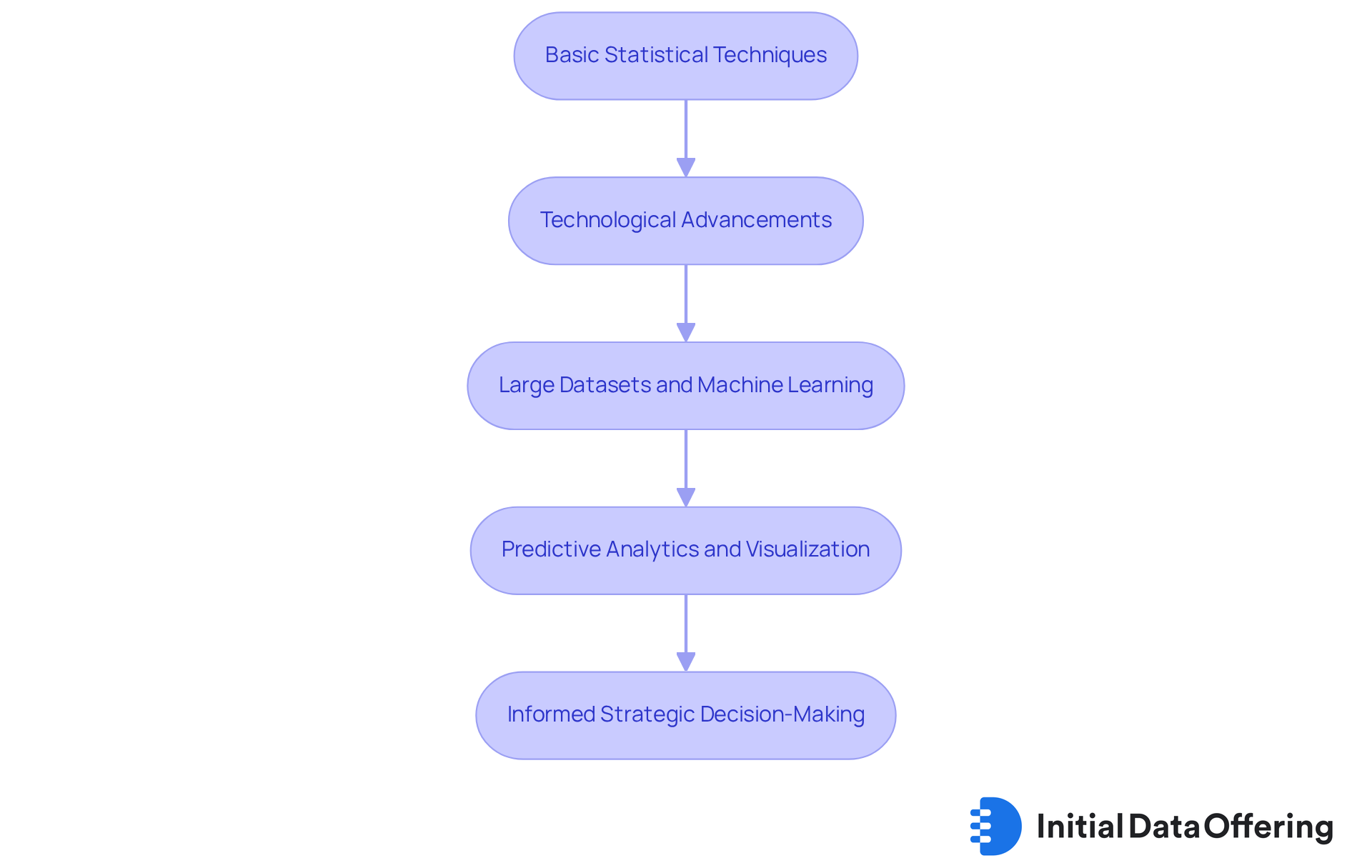Understanding Data Consultancy: Importance and Key Characteristics

Understanding Data Consultancy: Importance and Key Characteristics
Overview
Data consultancy plays a crucial role for organizations, offering expert guidance on information management and analysis. This support enables data-driven decision-making, which not only enhances competitive advantage but also boosts operational efficiency.
What are the key features of data consultancy? Companies that leverage data consultancy can significantly increase client acquisition and retention. By effectively utilizing analytics, they can improve revenue and demonstrate the tangible benefits of informed decision-making. This is particularly vital in today’s complex business environment, where data is abundant but insights can be elusive.
The advantages of engaging with data consultancy are clear. Organizations gain access to specialized knowledge that helps them navigate the intricacies of data management. This expertise allows them to make informed choices that can lead to better outcomes.
Ultimately, the benefits of data consultancy extend beyond mere numbers. By fostering a culture of data-driven decision-making, companies can position themselves for long-term success. How might your organization benefit from such insights? Consider the potential for enhanced efficiency and growth through informed strategies.
Introduction
In an era overflowing with data from numerous sources, organizations are increasingly acknowledging the crucial role of data consultancy in navigating this complexity. By leveraging expert guidance in information management and analysis, businesses can convert raw data into actionable insights. This transformation not only drives informed decision-making but also enhances operational efficiency.
However, as companies aim to become more data-centric, they often face significant challenges, including poor data quality and structural silos. How can organizations effectively utilize data consultancy to maximize their potential and secure a competitive advantage in this fast-changing landscape?
Data consultancy offers a structured approach to overcoming these hurdles. By focusing on the features of data consultancy—such as tailored strategies and expert insights—organizations can reap the advantages of improved data quality and streamlined processes. Ultimately, this leads to the benefit of making data-driven decisions that propel growth and innovation.
Define Data Consultancy and Its Importance
Information advisory refers to the practice of providing expert guidance and services related to information management, analysis, and interpretation. This encompasses a range of activities, including information gathering, processing, and extracting actionable insights from datasets. The importance of information advisory services lies in their ability to help organizations make informed decisions based on empirical evidence rather than intuition. In an era where data-driven decision-making is crucial, data consultancy acts as a vital resource for businesses seeking to enhance their competitive edge and operational efficiency.
Organizations that engage consultants can reap significant benefits. For instance, companies lose an estimated $5.2 million in revenue due to underutilized information, highlighting the potential gains from effectively leveraging this resource. Additionally, the information profession is witnessing a 36% growth rate, underscoring the increasing relevance of information advisory services in today’s market. Information advisory, through data consultancy, not only identifies data as a valuable asset but also aids in its integration into strategic planning, enabling companies to capitalize on new opportunities.
Real-world examples illustrate the impactful role of data consultancy. Take, for example, a multinational beverage and food company that successfully transitioned its customer analytics to a more efficient platform, greatly enhancing its operational capabilities. This case demonstrates how information consultants can boost operational efficiency by streamlining processes and optimizing resource usage, often employing advanced analytics tools and methodologies.
The influence of data-driven decision-making on organizational performance is profound. Companies that harness information insights are better equipped to anticipate trends and adapt their strategies accordingly, ultimately leading to improved outcomes. As Geoffrey Moore aptly states, "information is absolutely crucial to making smart business decisions," reinforcing the need to integrate analytics into organizational frameworks. Furthermore, Marissa Mayer emphasizes that "the earlier a company begins gathering information, the quicker they can benefit from its insights," highlighting the proactive advantages of information advisory services.
In conclusion, information advisory is more than just a service; it represents a strategic partnership that enables organizations to fully leverage their information assets, fostering innovation and promoting sustainable growth. Moreover, considerations surrounding information management and ethical practices are essential to ensure that data is utilized responsibly and effectively, further enhancing the value of advisory services.

Contextualize Data Consultancy in Today's Business Environment
In today's commercial landscape, businesses face an overwhelming influx of information from sources like social media, customer interactions, and market analysis. Data consultancy emerges as a crucial asset, guiding organizations through this complexity by offering tailored strategies for effective information utilization. Notably, 91% of business leaders assert that data-driven decision-making is vital for their success, and 83% of CEOs are focused on making their companies more information-centric. This trend underscores the growing recognition of information's value in enhancing customer experiences and optimizing operations.
For instance, companies leveraging data consultancy have reported significant competitive advantages. Organizations that adopt analytics-driven strategies are 23 times more likely to acquire new clients and six times more likely to retain them. A prime example is Slevomat, which experienced a 23% increase in sales after implementing the Keboola information innovation platform. Furthermore, effective use of predictive analytics can boost operating margins by up to 60%, with companies employing these techniques seeing an average revenue increase of 15%. This highlights the financial benefits of making informed decisions.
However, many organizations face challenges such as poor information quality and structural silos, which can hinder their ability to become truly insight-driven. As companies increasingly integrate data-driven insights into their strategic planning, data consultancy becomes essential for fostering innovation and achieving sustainable growth. How can your organization harness the power of information to drive success? By addressing these challenges and embracing data-driven strategies, businesses can unlock their full potential.

Identify Key Characteristics and Components of Data Consultancy
Consultancy in information, particularly data consultancy, is characterized by several key features that are essential for success. A robust analytical foundation, proficiency in management tools, and a commitment to delivering actionable insights stand out. These features empower skilled consultants in data consultancy to effectively interpret complex datasets, utilizing statistical methodologies and visualization techniques.
The advantages of these skills are significant. By collaborating closely with clients, data consultancy can tailor solutions that meet specific business needs. This collaboration is crucial, as it ensures that the data consultancy process is aligned with the client's objectives. Essential elements of effective consultancy in information management include governance, quality assurance, and strategic planning. These elements not only guarantee the accuracy and security of information but also ensure its relevance to the client's goals.
As organizations increasingly recognize the importance of information, the demand for skilled consultants in data consultancy is projected to rise by 11 percent over the next decade. This trend underscores the growing need for expertise in data consultancy. Implementing strong governance frameworks is vital for ensuring compliance and enhancing decision-making capabilities. Such frameworks define clear roles and processes for managing information throughout its lifecycle.
Resources like visualization software and quality management platforms, such as Tableau and Talend, play a crucial role in this process. They enable consultants to streamline operations and improve accessibility. As one strategy consultant aptly stated, "Companies possess vast amounts of information, but success isn’t about gathering it; it’s about management and insight." This highlights the critical role that effective information governance and management tools play in achieving successful outcomes in consultancy.
Moreover, it's important to note that only 20% of analytics insights are expected to yield business outcomes through 2022. This statistic emphasizes the necessity of efficient information management and governance for achieving success. However, organizations often face challenges in implementing these frameworks, including resistance to change and the complexity of information environments. These obstacles can hinder their ability to leverage information effectively.
How can organizations overcome these challenges? By prioritizing strong governance and investing in the right tools, they can enhance their information management practices and drive better business results.

Trace the Evolution of Data Consultancy Practices
The development of information advisory services has significantly evolved from its initial reliance on basic statistical techniques for analyzing market trends. What does this evolution mean for today's consultants? With technological advancements, the tools and methods used in information analysis have progressed remarkably. The emergence of large datasets and machine learning has transformed data consultancy, enabling consultants to analyze extensive collections with unparalleled accuracy.
Today, information advisory includes a wide range of services, such as predictive analytics and information visualization. These services are crucial for informed strategic decision-making. For instance, did you know that 72% of financial institutions utilize analytics for risk evaluation and management? This statistic highlights the practical applications of information advisory within the financial sector.
This transformation emphasizes the critical need for data consultancy to continuously adapt and innovate in response to new technologies and the ever-changing market demands. As Dan Heath points out, information analysts face challenges in converting raw data into valuable insights, underscoring the importance of effective data application in advisory practices.
Moreover, as Peter Sondergaard aptly noted, "Data is often considered more valuable than oil, but like oil, it is useless until properly mined and analyzed." This statement reinforces the necessity of effective data utilization in data consultancy practices, reminding us that the true value of data lies in its insightful application.

Conclusion
Data consultancy is a cornerstone of modern business, acting as a vital resource that helps organizations tap into the full potential of their information assets. By offering expert guidance in data management, analysis, and interpretation, data consultancy empowers companies to make informed decisions based on empirical evidence rather than just intuition. This strategic partnership is crucial as businesses seek to boost their competitive edge and operational efficiency in today’s data-driven landscape.
Several key aspects of data consultancy stand out:
- It fosters data-driven decision-making, which is essential for navigating complex market dynamics.
- Successful consultancy practices are characterized by their ability to adapt and evolve over time, responding to the changing needs of organizations.
- Notable statistics reveal the financial and operational benefits of leveraging data consultancy, such as enhanced client acquisition and retention rates, alongside significant revenue growth.
- Effective information management and governance frameworks are necessary to tackle common challenges organizations face in their quest for insight-driven strategies.
The importance of data consultancy cannot be overstated. As organizations navigate an increasingly intricate information environment, adopting data-driven approaches becomes vital for sustainable growth and innovation. By investing in robust data consultancy services, businesses can uncover new opportunities, streamline their operations, and improve overall performance. The time to prioritize effective data management and harness the power of information is now. After all, the future of business success hinges on the ability to transform data into actionable insights. How can your organization leverage data consultancy to drive success?
Frequently Asked Questions
What is data consultancy?
Data consultancy refers to the practice of providing expert guidance and services related to information management, analysis, and interpretation, including activities like information gathering, processing, and extracting actionable insights from datasets.
Why is data consultancy important?
Data consultancy is important because it helps organizations make informed decisions based on empirical evidence rather than intuition, enhancing their competitive edge and operational efficiency in a data-driven environment.
What are the potential benefits of engaging data consultants?
Engaging data consultants can lead to significant benefits, such as avoiding revenue losses from underutilized information, which can amount to an estimated $5.2 million for companies, and taking advantage of the growing relevance of information advisory services.
How does data consultancy help organizations capitalize on opportunities?
Data consultancy identifies data as a valuable asset and aids in its integration into strategic planning, enabling companies to capitalize on new opportunities and enhance their operational capabilities.
Can you provide a real-world example of data consultancy's impact?
A multinational beverage and food company successfully transitioned its customer analytics to a more efficient platform with the help of information consultants, greatly enhancing its operational capabilities and streamlining processes.
What is the effect of data-driven decision-making on organizational performance?
Companies that harness information insights are better equipped to anticipate trends and adapt their strategies, leading to improved outcomes and overall performance.
What do experts say about the importance of information in business decisions?
Geoffrey Moore states that 'information is absolutely crucial to making smart business decisions,' while Marissa Mayer emphasizes that 'the earlier a company begins gathering information, the quicker they can benefit from its insights,' highlighting the proactive advantages of data consultancy.
What considerations are essential in information advisory services?
Considerations surrounding information management and ethical practices are essential to ensure that data is utilized responsibly and effectively, further enhancing the value of advisory services.